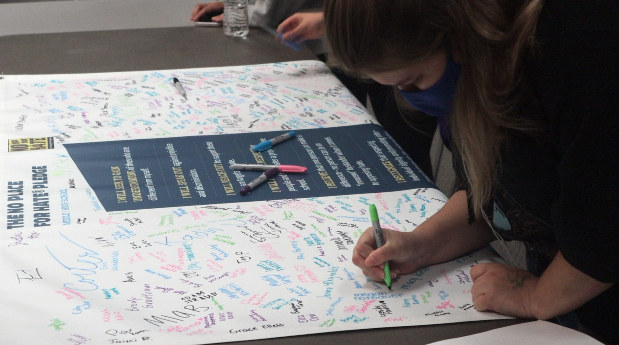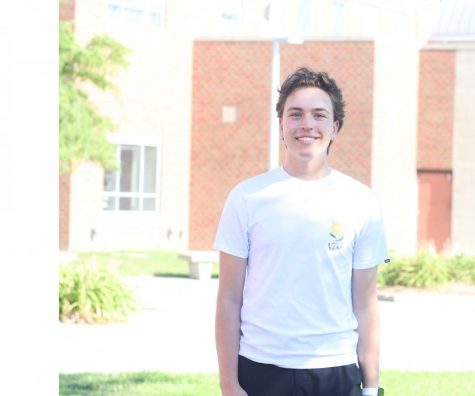A pledge for respect
Students show support for inclusivity within the school
Photo courtesy of Annabelle Harshbarger
Students sign the Resolution of Respect poster as a way to affirm their belief in the ideas promoted by the ADL and No Place for Hate campaign. The No Place for Hate is a student driven campaign that highlights the importance of making sure schools have an equitable and collaborative climate.
May 19, 2021
The students gathered around a table in the Commons during lunch on Wednesday, May 12 weren’t there to eat, rather these students were faced with a more significant task: signing the Resolution of Respect poster aimed at taking a stand against exclusive behavior and bullying. The strides made to make Millard West a No Place for Hate school took a combined effort from the Justice and Diversity League, Key Club and Diversity Council.
The poster hails from the No Place for Hate campaign which is intended to combat bias and bullying in the hopes of extinguishing the catalysts for hateful behavior within schools. The campaign was created by the Anti-Defamation League (ADL), an organization dedicated to stopping the defamation of Jewish people, as well as, securing fair treatment for all minority groups. The idea to reestablish West as a No Place for Hate school came from Justice and Diversity League sponsor Bryant Bull, who proposed the idea to the Diversity Council.
“The Resolution of Respect has always been the Anti-Defamation league’s standard for making sure that at least a majority, if not more, of the student population, is aware of the campaign, and the statement is about making every student accountable,” Bull said. “It’s a way of having students physically sign their name to a pledge that says ‘I’m going to do better, I’m going to try and be an agent for change.’ It’s a stereotype that teenagers are apathetic, that they have better things to do than to worry about having to make the world a better place, and so the Resolution of Respect is designed to make every student feel like they are a part of the movement.”
No Place for Hate is a student-driven campaign that highlights the importance of making sure schools have an equitable and collaborative climate. Being able to make students feel more comfortable in their environment plays a key role in allowing them the ability to put more effort into their education. It’s also incredibly important that students are being taught the importance of compassion and respect so that they can carry those ideals into their post-high school lives.
“I think it’s really important that during this time everyone is able to come together and really be unified as a school,” Diversity Council member junior Paige Seastedt said. “We live in a world where there is so much hate so it’s important that we learn as a community that that’s not acceptable. With the student signatures, it shows that our student body agrees with the message of inclusivity, and we’re able to be an official No Place for Hate school.”
Members from each club involved were in full support of the idea with the hope that this would encourage their classmates to play a more active role in the inclusion of others. Although club members played a crucial role in meeting requirements for the distinction, the student body really showcased the integrity Millard students carry. Many saw signing the poster as a way to affirm their belief in the ideas promoted by the ADL and No Place for Hate campaign.
“I signed the Resolution of Respect poster because I like to include everyone in everyday tasks,” senior Mia Busskohl said. “I believe in the golden rule which is ‘treating others how you would like to be treated’ and making everyone feel included and happy because that is what I like to see.”
Due to COVID-19 restrictions, the ADL’s requirements for schools hoping to achieve the No Place for Hate distinction were lowered, however, that does not diminish the work clubs like Justice and Diversity League did. With awareness months regarding minority groups like Native Americans, women and African Americans, along with volunteer hours put in at local food banks and cleaning up the Millard West campus, the group was able to start to process for the prestige status.
Nonetheless, schools were still limited in their ability to learn about ways in which they can reach out to their communities. In a normal year, students would be offered the opportunity to attend workshops that would allow for them to continue exploring ways to bring more inclusivity.
“We work with the Anti-Defamation League every year to send students to a conference that they do in the fall called Promoting Empowerment Workshop which is designed to teach sophomores at our school to become leaders,” Bull said. “It’s all a part of the No Place for Hate campaign, they want us leading our student body in making the school a better place, an inclusive place, stopping bullying, getting rid of prejudice and the No Place for Hate distinction is just a way of acknowledging that our school is trying to be better at that.”
Although the circumstances differed compared to regular years, it’s still important to celebrate the accomplishment of becoming a No Place for Hate school once again. It shows the student body’s commitment to fighting for an inclusive environment that will last beyond their time within the school.







